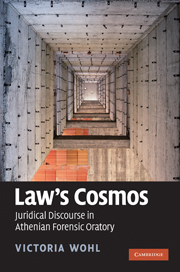Book contents
- Frontmatter
- Contents
- Preface: before the law
- Introduction: the rhetoric of law
- PART I THE BOUNDARIES OF LEGAL DISCOURSE
- 1 The world of law: oratory and authority
- 2 Legal violence and the limit of justice
- PART II THE LEGAL SUBJECT
- PART III TIME, MEMORY, REPRODUCTION: LAW'S PAST AND FUTURE
- Conclusion: the paradigmatic law
- Bibliography
- Index locorum
- General index
2 - Legal violence and the limit of justice
from PART I - THE BOUNDARIES OF LEGAL DISCOURSE
Published online by Cambridge University Press: 07 September 2010
- Frontmatter
- Contents
- Preface: before the law
- Introduction: the rhetoric of law
- PART I THE BOUNDARIES OF LEGAL DISCOURSE
- 1 The world of law: oratory and authority
- 2 Legal violence and the limit of justice
- PART II THE LEGAL SUBJECT
- PART III TIME, MEMORY, REPRODUCTION: LAW'S PAST AND FUTURE
- Conclusion: the paradigmatic law
- Bibliography
- Index locorum
- General index
Summary
The law is a calculated and relentless pleasure, delight in the promised blood, which permits the perpetual instigation of new dominations and the staging of meticulously repeated scenes of violence. The desire for peace, the serenity of compromise, and the tacit acceptance of the law, far from representing a major moral conversion or a utilitarian calculation that gave rise to the law, are but its result and, in point of fact, its perversion…Humanity does not gradually progress from combat to combat until it arrives at universal reciprocity, where the rule of law finally replaces warfare; humanity installs each of its violences in a system of rules and thus proceeds from domination to domination.
Foucault 1977b: 151LAW IN A FIELD OF PAIN AND DEATH
The law, as Robert Cover famously put it, “takes place in a field of pain and death.” As a result of a jury's ruling, an individual may lose his or her savings, family, freedom, or even life. The exercise of law implies and, indeed, demands a kind of violence. Legal judgments must be enforceable and therefore require force; force is interior to the law. How does legal discourse legitimate that interior force and distinguish it from the violence beyond law's borders? Can it even make this distinction? Is the legitimacy of law's force decidable within the terms of the law itself? If it is, legal discourse risks falling into a self-justifying hermeticism: law's force is legitimate because it is the law.
- Type
- Chapter
- Information
- Law's CosmosJuridical Discourse in Athenian Forensic Oratory, pp. 66 - 112Publisher: Cambridge University PressPrint publication year: 2010

